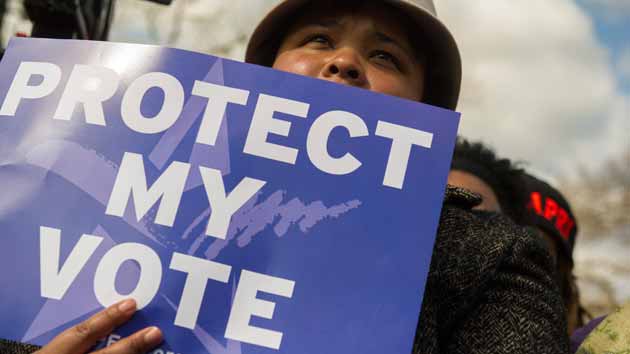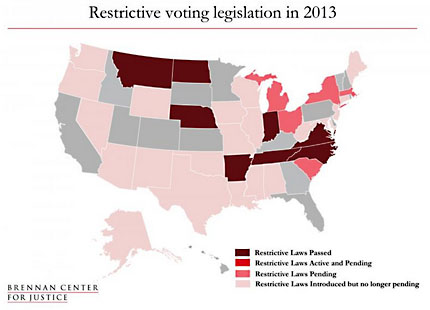
Rod Lamkey Jr./Zuma
Seven months ago the Supreme Court gutted the Voting Rights Act, one of the great achievements of the civil rights era. They did this by striking down preclearance, a provision in the law that required certain states to get prior permission from the federal government before making changes to election laws.
Preclearance has long been the federal government’s strongest bulwark against abusive voting laws. It’s also a fairly extraordinary exercise of federal power, something the Supreme Court acknowledged in 1966, when it heard its first challenge to the VRA. But extraordinary as preclearance might be, the court ruled that it was defensible in extraordinary circumstances—and that was exactly what we faced at the time. The nine states originally covered by the preclearance provision had acted so egregiously to violate voting rights, and were so adept at tying up federal suits in court, that preclearance was justified.
It was those extraordinary circumstances that were at the heart of the challenge to the VRA last year. When the VRA was renewed in 2006, the preclearance formula in Section 4 of the law was left unchanged. But Chief Justice John Roberts has long believed it’s implausible that the original set of states covered by the VRA half a century ago should be the exact same set covered today, something he made clear in Shelby County v. Holder:
At the time, the coverage formula—the means of linking the exercise of the unprecedented authority with the problem that warranted it—made sense….Nearly 50 years later, things have changed dramatically….Yet the Act has not eased the restrictions in §5 or narrowed the scope of the coverage formula in §4(b) along the way.
….Congress—if it is to divide the States—must identify those jurisdictions to be singled out on a basis that makes sense in light of current conditions. It cannot rely simply on the past. We made that clear in Northwest Austin, and we make it clear again today.
….We issue no holding on §5 itself, only on the coverage formula. Congress may draft another formula based on current conditions. Such a formula is an initial prerequisite to a determination that exceptional conditions still exist justifying such an “extraordinary departure from the traditional course of relations between the States and the Federal Government.”
This left an opening for Congress to revive the Voting Rights Act. Preclearance itself, Roberts wrote, was defensible. But the formula for deciding which states were covered had to be based on current conditions, not merely copied by rote from the original law.
Unfortunately, there was another current condition that Roberts chose not to acknowledge: that the modern Republican Party is so dependent on the votes of Southern whites that it was vanishingly unlikely to ever support any preclearance formula that primarily affected Southern states—as any rational formula inevitably would. For all practical purposes,  preclearance was dead, and with it the most powerful weapon the federal government has to prevent racially motivated changes to voting laws.
preclearance was dead, and with it the most powerful weapon the federal government has to prevent racially motivated changes to voting laws.
Or so it seemed in the immediate aftermath of Shelby County. Republican-dominated states immediately redoubled their efforts to restrict voting in ways that disproportionately burdened minority voters—most notably via restrictive voter ID requirements, but also with a wide variety of constraints on both voter registration and early voting. The more honest among them admitted that their new laws were indeed directed against a particular class of voters, but said that the class at issue was Democrats, and it was perfectly legal to discriminate against Democrats. The fact that minority voters were heavily affected because they tend to be Democrats was just an unfortunate side effect.
But as laws like this started to pile up, and as evidence that they really were aimed at voter suppression became clearer, a small backlash began. Most dramatically, Judge Richard Posner, who wrote a decision in 2007 upholding Indiana’s voter ID law, issued a mea culpa last October. “I plead guilty to having written the majority opinion (affirmed by the Supreme Court) upholding Indiana’s requirement that prospective voters prove their identity with a photo ID—a law now widely regarded as a means of voter suppression rather than fraud prevention.”
All of which brings us up to last week, when a bipartisan trio of lawmakers introduced legislation that would partially reverse the Supreme Court’s handiwork in Shelby County. Basically, it takes up John Roberts’ challenge to create a new formula for preclearance that takes into account current conditions. In particular, any state with five or more violations of federal election law over the most recent 15 years would be subject to preclearance. Preclearance would last for ten years from the most recent violation, and states would roll in or out of the preclearance requirements depending on their performance over the preceding 15 years.
There are a few additional details, as well as rules for local jurisdictions. In addition, the law would allow the federal government to “bail in” a state for preclearance if it can show intentional voting discrimination. It also puts in place new notification requirements for changes to state elections laws; makes it easier to obtain preliminary injunctions against new election laws; and expands the attorney general’s power to monitor elections. Ari Berman has a detailed rundown here.
And now for the big question: does this legislation have any chance of passing? It doesn’t seem likely. The shiny new formula might satisfy Justice Roberts, but it would put four deep-red states back into preclearance jail: Georgia, Louisiana, Mississippi, and Texas. And what would Republicans get in return? They seem to have given up entirely on appealing to non-white voters, so there’s nothing for them there. And while it’s one thing to feel obliged to vote in favor of renewing a historic law that’s currently on the books, as most Republicans did in 2006, it’s quite another to invite a vote that you don’t have to take in the first place.
So the odds seem pretty long against reviving preclearance. That may be a helluva note to usher in Martin Luther King Jr. Day with, but it’s most likely the truth. Now that blacks and Hispanics identify so overwhelmingly as Democrats, Republicans simply have no incentive to make it easier for them to vote. Nor does it seem possible to shame them into doing it, as it was even eight years ago. The GOP has simply changed too much since 2006.
Half a century ago, the fight over the VRA was a fight between racists and everyone else. Today, it’s a fight between Republicans and Democrats. You’d think that might make it an easier fight to win, not a harder one. But it’s not.














